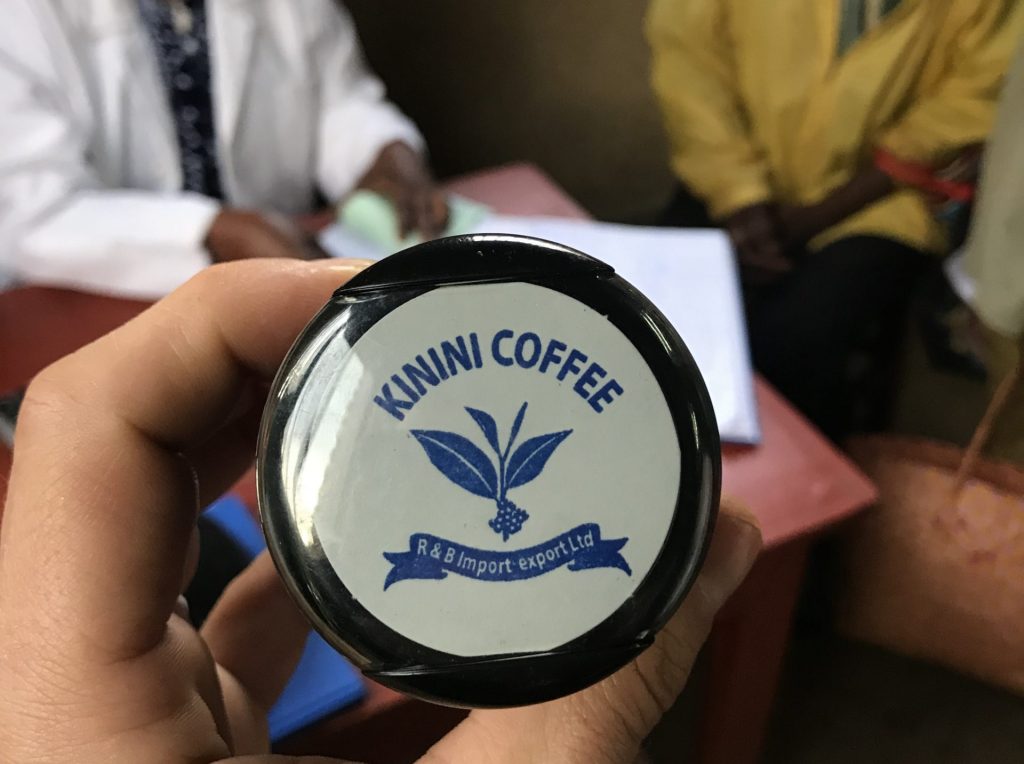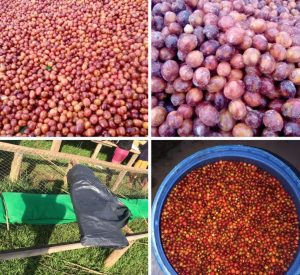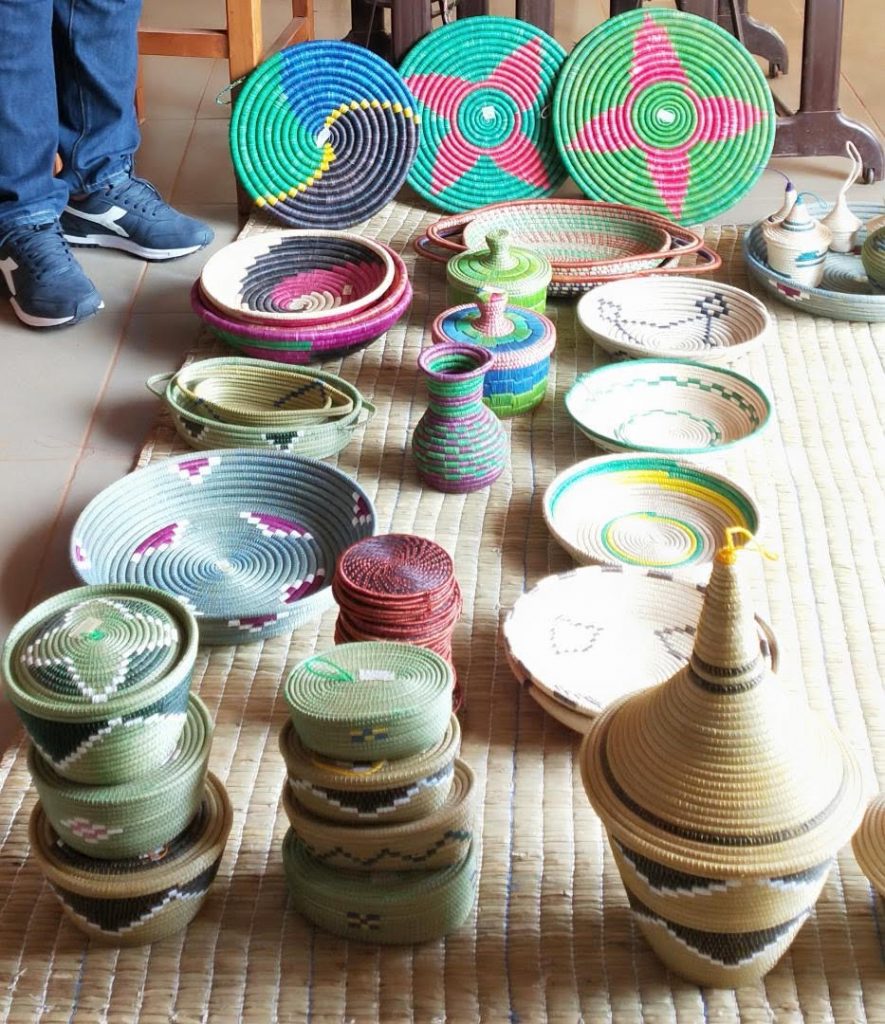If you would like more than 8 samples, please contact a trader directly.
Cart
A trader will contact you with shipping and payment options after checkout. Please note: free samples are provided to commercial roasting businesses only.
Over the past four years, we have built and solidified our relationship as the sole importer to North America for two partners that are changing people’s perceptions of what Rwandan coffee “is”. They are Kinini Coffee and Nova Coffee, both located in the lesser-known (and often higher elevation) Northern Province.
When faced with seemingly insurmountable challenges this harvest, our partners at Kinini and Nova overcame the odds and produced some of the best Rwandan coffee we have ever tasted. The answer to the question, “how did that possibly happen during a pandemic”, is long, and one that I’m thrilled to tell.
While it might be cruel to tell you that this almost happened, the Kinini Coffee team was supposed to fly to the US for a roaster-visit tour in April 2020 and emailed on March 10th to confirm the dates. (For context, SCA Expo was still on schedule to happen at that time.) Only 10 days later on March 20th, both New York City and Rwanda issued Covid lockdown measures. While NYC relied mostly on social compliance for the lockdown, Rwanda brought strict enforcement for its curfews and mask mandates. Penalties escalated quickly from $26 USD (25,000 Rwandan shillings) to a year in jail. The intensity and enforcement of the lockdown had huge implications for the coffee harvest. Movement from zone to zone was extremely restricted which made normal harvest transport logistics incredibly difficult, impossible, or financially prohibitive. A strict curfew also limited the amount of work that could be done each day. To compound issues, the month of May did not bring its usual rains which meant a lot of the cherries dried before maturing. Low yields met limited logistics and limited labor. Our pre-harvest phone/zoom calls shifted from the usual lot planning to ensure that all partners had the PPE and support they needed. As the harvest rolled along, Covid restrictions were enacted on the export level including a mandate that every green coffee sample sent abroad needed its own phytosanitary certificate. Finally, the cupping labs that usually evaluate early harvest samples were not available; so our partners sent us coffee blind, handing me the unique privilege of being the first person to taste our partner’s lots from this harvest. Imagine my surprise when I was blown away on the cupping table. How was that possible? I had expected good, but as a realist, I didn’t see this quality coming during a pandemic. It was one of the happier phone calls I got to make in 2020 to share the news with them.
How though? For those not familiar with our partners at Kinini and Nova, they are innovators who are as passionate about creating sustainable, positive change for smallholder producers as they are about producing high-quality coffee. The truth is that there wasn’t a silver bullet for quality here, or as the SCA likes to put it, this didn’t “just happen”. This year wasn’t just about coming up with on-the-fly creative solutions during a pandemic to keep a washing station running at the quality level that it expects. It was about having a team that was ready and capable for curve-balls such as this, and a strong trust established with producers that they would work together to do the best they could. It was about work and projects that were years in the making, coming to fruition. Calling attention to just a few of these projects will give you an idea of the care and attention that goes into making these coffees special.

For the past 3 years, Kinini has been working with a company called WeatherSafe. WeatherSafe is a UK based company that uses satellite technology to help farmers with what they call “big data”. They are a company that believes, as I do, deeply in the Kinini mission, so they offer their services to Kinini for free. I think of them as Kinini’s big brother in the sky, since their main value is actually having eyes on Kinini’s crops from space. Yup, space. Being able to share these images throughout the harvest with agronomists allows better advice to be given on when and where to prune, add fertilizer, etc. The agronomists confirm what these pictures suggest with on-the-ground soil analysis to give the best possible advice. Since the start of the project, productivity has gone up by 2 kilos of cherry per coffee plant!
All cherry now gets floated immediately upon delivery (even remote sites that don’t deliver directly to the washing station), as well as inspected for red ripe cherries. The farmers receive “fiches” or receipts that clearly states, among other things, how many red ripe-non floating cherries they deliver. Farmers receive a 10% bonus per kilo of red ripe non-floating cherry that they deliver at the end of the harvest.
Kinini intentionally discourages hierarchy at the washing station and self identifies as a “flat team”. It’s about coming together with a common goal, each person with their own responsibilities. Patrick is the agronomist, Jeanne manages the finances, Phineas is the quality controller, and no one manages the other.
On my visit to Kinini last harvest they had only just started a small vermicomposting operation right at the Kinini Washing Station. Since then they have expanded the program to benefit over 500 people with worm-made high-quality natural fertilizer! Producers have taken worms home to start their own system at the farm level. This is one of the many things that helps Kinini be organic, although they choose not to pay for the certification.
You don’t know what you have until you try it. After a natural process experiment turned into an incredible win in 2019, Kinini scaled it up this year and is also expanding into a honey processing for next year.

When the renowned, competition-winning Cocatu Cooperative (also located in the north) was on the edge of financial ruin and had to sell their washing station, Kinini bought it to save the group. The washing station required so much work to be done, that Kinini decided instead of re-building, all cherries from the Cocatu Cooperative would get trucked to the Kinini Washing station so they could process them properly (and separately from Kinini coffee). I’ve tasted this coffee, it’s beautiful, and no doubt better than what it would have been at the old washing station. This act alone saved an incredible coffee from disappearing and kept engaged specialty farmers in the market.
There is so much more that I want to say about Kinini. I want to talk about them building out their lab and joining the Arc S family this month. The fact that they hand-pick out all defects even after the coffee has been dry milled because they want to make sure it’s good enough for the “Kinini” name. The reminder that 10% of their profits help fund a school in eastern Rwanda of 400 pupils from 4-11 years of age (mainly made up of orphans), and a health post that treats over 900 patients a month. However, I’ll leave it there and let the profiles of the coffee speak for themselves. If you haven’t added Rwandan coffee to your menu yet, I suggest this is your starting point.
Cantaloupe, caramel, chocolate ganache, lemon marshmallow, lingering brown sugar and orange, vanilla fluff
Blackberry jam, lychee, green apple, merlot wine gum, caramel
Nova purchased 4 hectares this year, as well as seedlings and nursery beds, to set up a large nursery. This nursery is to be managed by the Women and Youth Committee at Nova, and capacity training has already happened on how to prepare the nursery and manage it. This space is also used to support the educational training that Nova conducts for all farmers (not just contributing Nova smallholders).
Nova conducted outreach events across the region to encourage the youth and women specifically to engage in coffee farming. This outreach was for women and youth across all zones, not just farmers that contribute to their washing station. These efforts are picking up the mantle of Agnes’s father’s work, who promoted specialty coffee in the region for his entire career, only to see much of it disappear after the genocide.
After a lot of research in between harvests, Nova experimented with carbonic maceration and what they call “funky processing”. These microlots tasted extremely unique, showed promise, but were a bit wild for us to purchase this year. This process though, is why we are so happy to work with Nova, and why we only buy natural process coffee from them. They never settle for “good enough”, and are pushing the boundaries of what natural process coffee in Rwanda can be.
Every year I cup through a lot of different Nova lots from the entire harvest. I can only do this because of the incredible lot separation that Nova does. It may sound easy, but it’s a logistical headache for them to process so many individual small lots. We work conjointly to put the very best tasting lots together, keep out the bad, and get up to an exportable volume. This exercise has been driven by Nova’s commitment to finding and rewarding good coffee, and it has allowed them to identify different processes, varietals, and catch-basins that track with quality.
 For those who are already familiar with Agnes and the Nova team, you know she is one of the fiercest advocates of women in coffee. This year that support continues in spades. While I’ve shared with you some of the projects above, it’s difficult to categorize all the individual acts of Agnes’s kindness that pop up in our conversations. As a pharmacist, she just always wants to help people however she can. On one call I’ll find out that she sponsored a young girl who works as a casual laborer for Nova to go back to school, and on another call, I’ll find out that she started a basket weaving program for the Dukorere Kawa Bukure Women’s Cooperative so that they can have a new source of income, and another reason to come together as a group. While it may seem tangential to coffee, Agnes sets a culture of caring passionately about people and about coffee, and you can see how that culture follows through in these lots.
For those who are already familiar with Agnes and the Nova team, you know she is one of the fiercest advocates of women in coffee. This year that support continues in spades. While I’ve shared with you some of the projects above, it’s difficult to categorize all the individual acts of Agnes’s kindness that pop up in our conversations. As a pharmacist, she just always wants to help people however she can. On one call I’ll find out that she sponsored a young girl who works as a casual laborer for Nova to go back to school, and on another call, I’ll find out that she started a basket weaving program for the Dukorere Kawa Bukure Women’s Cooperative so that they can have a new source of income, and another reason to come together as a group. While it may seem tangential to coffee, Agnes sets a culture of caring passionately about people and about coffee, and you can see how that culture follows through in these lots.
Grape, cran-orange, grapefruit, kiwi, finger limes, black cherry
Peach-nectarine schnapps, orange, sumac, papaya, rose, tea tree, vanilla
*This lot is a combination of the 2 highest scoring peak harvest natural lots that were processed at Nova Coffee this harvest (that weren’t directly traceable to the Women’s Cooperative). Three different cooperatives deliver and sell their cherries to the Nova washing station:
Throughout the harvest, farmers will sell some of their cherries to Nova explicitly as part of the cooperative, and some outside of the cooperative. This blend lots we tasted all harvest that weren’t hyper-traceable to one of the 3 co-ops, bringing them together under the Nova name.